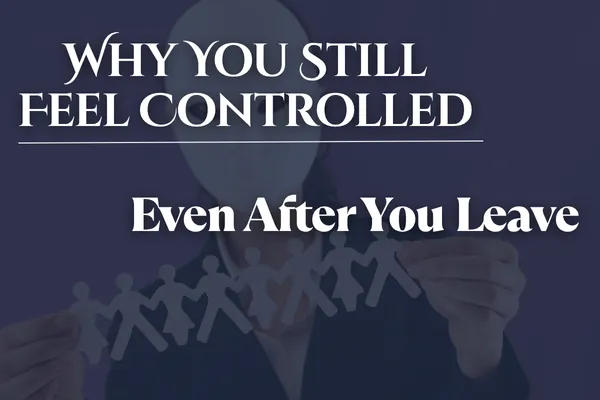
Why You Still Feel Controlled, Even After You Leave
You walked away from the relationship. So why does it still feel like they’re pulling the strings?
Why does one message still ruin your entire day?
Why does your stomach drop when you hear a notification ping?

Why do you feel like you’re living in defense mode, even though you’re no longer living together?
If you’ve ever thought, “I should be over this by now” or “Why can’t I just move on?” you’re not alone. And more importantly, you’re not broken.
You’re experiencing something most people around you don’t understand:
The aftershock of psychological control.
Control Doesn’t Always End with Separation
Leaving a toxic relationship doesn’t hit a reset button. It opens a new chapter, one where the control may become even more subtle, but still just as potent.
You may not be yelled at anymore.
You may not be silenced directly.
But now? You’re monitoring yourself.
You rewrite your texts six times so they don’t twist your words.
You pre-explain everything in case they accuse you of being "difficult."
You avoid asking for what your child needs because you don’t want to “poke the bear.”
Let’s be honest.
That’s not freedom.
That’s still control, just outsourced into your own nervous system.

The Nervous System Doesn’t Lie
If your body still feels like it’s bracing for impact, it’s because it is.
When you’ve been through chronic emotional manipulation, your body learns to scan for threats. It’s constantly asking:
Will this message set them off?
Will they make me look bad again?
Will this turn into a fight I didn’t see coming?
Even in their absence, your body remembers the pattern. And until you recognize it for what it is, your mind will keep trying to “think your way out” of something that’s actually physiological.
This is why the smartest, strongest people still feel stuck.
It’s not about intelligence.
It’s about the lasting imprint of prolonged emotional abuse.
Why You Downplay It
Here’s the part no one tells you:
Most survivors of coercive control minimize what they’re going through.
You convince yourself:
“Maybe I’m being dramatic.”
“At least it’s not physical.”
“Maybe this is just normal co-parenting.”
You gaslight yourself because you were trained to be gaslit.
They’ve spent years making you doubt your instincts. They don’t need to say the words anymore—you do it for them.
But just because the abuse doesn’t leave bruises doesn’t mean it’s not real.
Your trauma doesn’t need to meet someone else’s definition of “bad enough” to matter.
You’re Not Overreacting. You’re Over-Adapting.
Let’s reframe this right now:
Your hypervigilance? It was your survival skill.
Your overthinking? That was protection.
Your freeze responses, your shutdowns, your silence? That was how you stayed safe.
But now that you're out, it’s time to start untangling from those responses. Not overnight. Not perfectly. But intentionally.
You don’t have to pretend you’re “fine” to make others comfortable.
You don’t need to “prove” you’ve moved on to be taken seriously.
You’ve endured the storm.
Now comes the recalibration.
So What Does Healing Actually Look Like?
Healing after coercive control isn’t about pretending you’re unaffected.
It’s about building emotional safety inside yourself. Brick by brick.
It starts when you:
Hear a nasty message and decide not to respond right away.
Get accused of something untrue and stop wasting your breath defending it.
Realize you don’t owe them peace just to avoid conflict.
Ask for help even if your voice shakes.
Stop justifying your boundaries.
Start protecting your energy like your life depends on it, because it does.
It’s in the micro-decisions.
The inner conversations.
The moments you choose you, even when it feels terrifying.

The Loneliness of Being the Only One Who Sees It
One of the hardest parts of post-separation abuse is that no one else sees it the way you do.
To the outside world, they might seem cooperative. Calm. Reasonable.
They weaponize their charm in public and unleash their manipulation in private.
And when you try to explain the patterns, you risk sounding petty or paranoid.
This makes you isolate.
It makes you shrink.
It makes you suffer in silence because “it’s not that bad” or “you don’t want to cause drama.”
But let me say this:
Your truth doesn’t become less true just because others can’t see it.
Here’s Your First Step
Before you figure out how to respond to the next message or how to prepare for the next handoff—start here:
Notice when you’re bracing. That flinch before you open the app? That’s your body signaling something. Respect it.
Stop shaming your reactions. Your triggers don’t mean you’re weak. They mean your system is working overtime to protect you.
Name what’s happening. Not just “I’m stressed.” Say it: “This is a trauma response. This is leftover control showing up in my body.”
Practice safety from within. Whether it’s breath-work, cold water, journaling, or turning off notifications, give your nervous system a signal that you’re in charge now.
You left the relationship.
Now let’s help your body, your brain, and your boundaries catch up.
Freedom isn’t just physical, it’s emotional.
And you’re on your way there.
